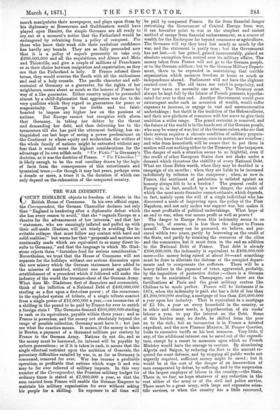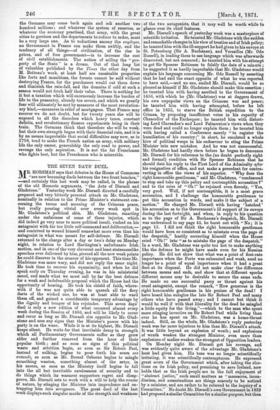THE WAR INDEMNITY.
COUNT BISMARCK objects to freedom of debate in the British House of Commons. In his own official organ, the Correspondent, the German Chancellor declares not only that "England is hankering after a diplomatic defeat which she has every reason to avoid," that she "regards Europe as a theatre for the advancement of her interests," and that her "statesmen, who are amazingly inflated and puffed up with their self-made illusions, will act wisely in avoiding the in- evitable collapse that must follow any contact with hard and solid realities;" but warns her that "proposals and motions are continually made which are equivalent to so many direct in- sults to Germany," and that the language in which Mr. Glad- stone rejects them "furnishes food for serious consideration." Nevertheless, we trust that the House of Commons will not separate for the holidays without one serious discussion upon the new misery which the German statesmen have added to the miseries of mankind, without one protest against the establishment of a precedent which if followed will make the industry of the world the treasure-chest of the German Army. What does Mr. Gladstone, first of financiers and economists, think of the infliction of a National Debt of £400,000,000 sterling as a fine upon a first-class power ; of the recurrence to the exploded system of tribute, of a single tribute exacted from a single power of £12,000,000 a year,—an income-tax of a shilling in the pound to be paid by France for ever to enrich a foreign state? The Germans demand £200,000,000 sterling in cash or its equivalents, payable within three years ; and as France is powerless, and the money not absolutely beyond the range of possible collection, Germany must have it ; but just see what the exaction means. It means, if the money is taken in Rentes, a payment of a thousand millions per century by France to the German Army. Nations do not die, and as the money must be borrowed, its interest will be payable by unborn generations ; or if it is taken in cash, it means that the single effectual restraint upon the ambition of Generals, the pecuniary difficulties entailed by war, is, as far as Germany is concerned, removed for ever. War has become a profitable operation, so profitable that nations which wage it and win may be for ever relieved of military imposts. In this very number of the Correspondent, the Prussian military budget for ordinary times is stated at £7,000,000 a year, so that the sum exacted from France will enable the German Emperor to maintain his military organization for ever without asking his people for a shilling. Its expenses to all time will be paid by conquered France. So far from financial danger restraining the Government of Central Europe from war, it can hereafter point to war as the simplest and easiest method of escape from financial embarrassment, as a source of wealth for the Exchequer far beyond commerce or agriculture. The Germans will say they have lost nearly as much by the war, and the statement is partly true ; but the Government has not lost,—it has gained, gained immeasurably, gained an absolute exemption from control over its military affairs. The money taken from France will not go to the German people, or to the German soldiers ; but to the German Military Depart- ment, there to be expended in maintaining that terrible organization which menaces freedom at home as much as independence abroad. Parliament will not have the slightest control over it. The old taxes are voted in perpetuity, and. for new taxes no necessity can arise. The Treasury must always be kept full by the labour of French peasants, hypothe- cated for ever to that end. Another Government would grow extravagant under such an accession of wealth, would suffer expenses to increase, or engage in vast and unremunerative undertakings ; but thrift is the tradition of the Hohenzollerns, and their new plethora of resources will but serve to give their ambition a wider range. The grand restraint is removed, and the future of the world is in the hands not of the German people, who may be weary of war, but of the German rulers,who see that their system requires a chronic conditiou of military prepara- tion; who know that their armies, once in motion, are resistless ; and who from henceforth will be aware that to put them in motion will cost nothing either to the Treasury or the taxpayers. The danger of such a situation seems to us frightful, even if the credit of other European States does not shake under a demand which threatens the stability of every National Debt. What are those Debts worth, when they may be doubled in a campaign of six months ; when they are liable to be increased indefinitely by tributes to the conqueror ; when, as now in France, the sentiment of patriotism is enlisted against an honesty always felt to be a burden ? The general credit of Europe is, in fact, assailed by a new danger, the extent of which the most acute financier cannot estimate, which depends, in fact, mainly upon the will of a single individual who has discovered a mode of improving upon the policy of the First Napoleon, and not only makes war support war, but makes it the most profitable of political undertakings. What hope of an end to war, when war means profit as well as power?
The danger to Europe from this indemnity seems to us. grave, but, of course, it is less than the danger to France herself. The money can be procured, we believe, and pro- cured within two years, partly by borrowing on the credit of the State, and partly by straining the resources of the cities. and the communes, but it must form in the end an addition to the National Debt of France. That debt is already £600,000,000, the indemnity is equivalent to £400,000,000'- more—the money being raised at about 50—and something- must be done to alleviate the distress of the occupied depart- ments and to compensate the sufferers. There will be a heavy failure in the payment of taxes, aggravated, probably, by the imposition of protective duties ;—there is a German. army to be maintained in Champagne, and there are the fortifications of Paris and the great military centres like Chalons to be made perfect. France will be fortunate if in 1874, when the indemnity is paid, she has a debt of less than £1,200,000,000 sterling, a mortgage of less than £36,000,000 a year upon her industry. That is equivalent to a mortgage of £5 10s. a year on every household in the country, or in other and clearer words, a hypothecation of six weeks' labour a year, to pay the interest on the Debt. Some of this burden may, no doubt, be shifted from the poor on to the rich ; but an income-tax is in France a detested expedient, and the new Finance Minister, M. Pouyer Quertier, looks to excessive tariffs as his best resource. Very little, if any, of the additional interest can be saved out of the expendi- ture, except by a resort to measures upon which no French. Ministry would have the courage to venture. By abandoning, Algeria and Saigon, by reducing the fleet to the amount re- quired for coast defence, and by stopping all public works not urgently required, sufficient money might be saved ; but it would be at the cost of the danger of an insurrection of men exasperated by defeat, by suffering, and by the suspension of the largest employer of labour in the country,—the State. There is, we fear, no hope whatever of any reduction in the cost either of the army or of the civil and police service. There must be a great army, with large and expensive scien- tific services, or when the country has a little recovered,
the Germans may come back again and ask another two hundred millions ; and whatever the system of reserves, or whatever the economy practised, that army, with the great cities to garrison and the departments to reduce to order, must be a very large one. As to reductions among the employes, no Government in France can make them swiftly, and the tendency of all things—of civilization, of the rise in prices, and of free government—is to increase the cost of civil establishments. The notion of selling the "pro- perty of the State" is a dream. Out of that long list of valuables published by the Times the other day from M. Boiteau's work, at least half are unsaleable properties like forts and munitions, the forests cannot be sold without destroying France, for the purchasers would cut them down and diminish the rain-fall, and the domains if sold at such a season would not fetch half their value. There is nothing for it but a taxation which will enormously increase the burden of life to the peasantry, already too severe, and which we greatly fear will ultimately be met by measures of the most revolution- asy kind,—measures in relief of mortgagees. That France may recover we do not doubt, but for twenty years she will be exposed to all the disorders which heavy taxes, constant deficits, and revolutionary finance experiments bring in their train. The Germans think that therefore she will be weak, but their own strength began with their financial ruin, and it is by no means improbable that social difficulties may now, as in 1798, tend to make the French nation an army, with military life the only career, generalship the only road to power, and revenge the only aspiration. It is not the fat Frenchman who fights best, but the Frenchman who is miserable.



































 Previous page
Previous page